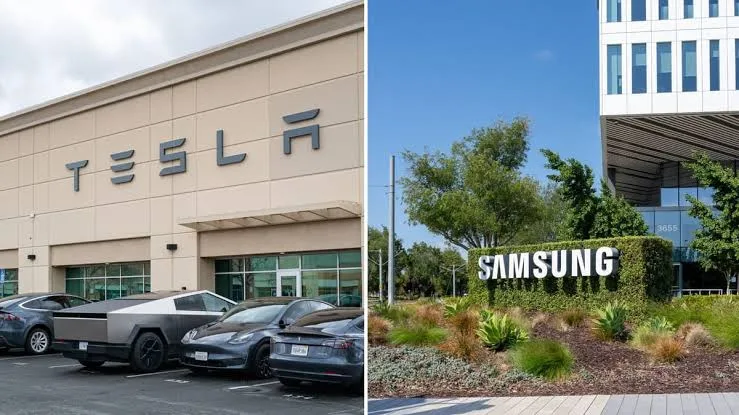Tesla CEO Elon Musk on Monday confirmed a $16.5 billion semiconductor supply agreement with Samsung Electronics, marking a major long-term partnership aimed at reviving the South Korean giant’s underperforming foundry division.
“Samsung’s giant new Texas fab will be dedicated to making Tesla’s next-generation AI6 chip. The strategic importance of this is hard to overstate,” Musk said in a post on X.
The announcement boosted Samsung shares by more than 4%. While Samsung had previously disclosed the deal without naming the client—citing confidentiality—a Reuters report confirmed Tesla’s involvement, based on three sources familiar with the matter.
Musk said the chips will be produced at Samsung’s upcoming manufacturing facility in Taylor, Texas, a site that has experienced delays and raised concerns about Samsung’s ability to hold onto major clients. “Samsung agreed to allow Tesla to assist in maximizing manufacturing efficiency. This is a critical point, as I will walk the line personally to accelerate the pace of progress. And the fab is conveniently located not far from my house,” he added.
Running through 2033, the agreement arrives at a pivotal moment for Samsung, which has lost ground to competitors like TSMC and SK Hynix in the race to produce advanced AI chips. The lag has dented profits and shaken investor confidence.
Pak Yuak, an analyst at Kiwoom Securities, estimated that Samsung’s foundry unit may have posted losses exceeding 5 trillion won ($3.63 billion) in the first half of 2025. Analysts believe the Tesla deal could help offset those losses and restore competitiveness in the division.
Despite being the world’s leading memory chipmaker, Samsung’s contract chip-making business—producing custom logic chips for clients—has struggled to retain key accounts. Many major tech companies, including Apple, Nvidia, and Qualcomm, have opted for rival TSMC instead.
Although Samsung is working to improve yields for its cutting-edge 2-nanometer process, the Tesla order is not expected to use this advanced technology, according to BNK Investment & Securities analyst Lee Min-hee.
Beyond commercial implications, the deal carries broader geopolitical significance. South Korea is actively pursuing deeper technology ties with the United States in sectors like semiconductors and shipbuilding. The agreement also comes as Seoul continues negotiations to avoid potential 25% U.S. tariffs on certain exports.


